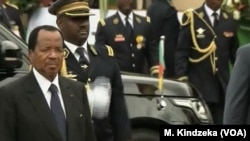Cameroon will hold presidential elections on Oct. 7, head of state Paul Biya said in a decree issued on Monday.
Elected in 1982, the 85-year-old is Africa’s oldest and longest-serving president, but has yet to say whether he will bid for another term, although his supporters are already urging him to put his name forward.
The vote will take place in a context of mounting problems in the oil-rich state, which faces an insurgency by anglophone separatists in the west and bloody incursions by Boko Haram jihadists in the north.
The main opposition, the Social Democratic Front (SDF), has already designated its candidate, Joshua Osih.
Other declared candidates include Akere Muna, a lawyer and former vice president of Transparency International, and Maurice Kamto, head of the Movement for the Rebirth of Cameroon (MRC).
Earlier Monday, residents in Buea, the main city in the predominantly anglophone Southwest Region, said gunfire broke out in the administrative district and lasted several hours, marking a further escalation in the separatist crisis.
Anglophones, chafing over perceived discrimination at the hands of the francophone majority, launched a campaign for greater autonomy in 2016.
Biya took a hard line, rejecting demands for a return to Cameroon's federal structure and ordering a crackdown after the separatists issued a symbolic declaration of independence last Oct. 1.
According to a government report last month, separatists had killed 74 soldiers and seven police since late 2017 while more than 100 civilians had died "over the past 12 months."
The UN says 160,000 people have been internally displaced and 20,000 have sought refuge in neighbouring Nigeria.
Northern Cameroon, meanwhile, has suffered by incursions by Boko Haram jihadists from neighbouring Nigeria.
Since 2014, the group has killed 2,000 civilians and soldiers and kidnapped about 1,000 people, according to an analysis by the International Crisis Group (ICG) think tank.
